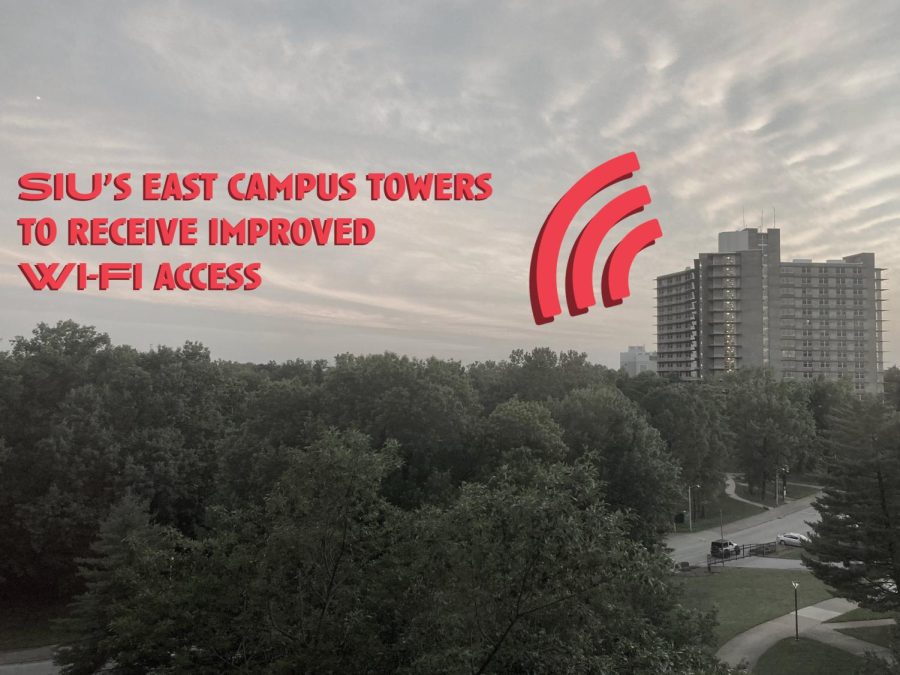SIU’s east campus towers to receive improved Wi-Fi access
Each of the towers on SIU’s east campus has one wireless access point on each of the 17 floors. From the 9th story of Mae Smith at the end of the hall, furthest away from the access point, the internet connection fails at least twice a week for short periods of time.
This creates a problem when students need to access the internet for their daily work and are unable to do so at times, from their dorm rooms.
Administration is hoping to solve this problem by installing wireless access points in each of the rooms in all three of the 17-story towers on east campus during the summers of 2022 and 2023.
Advertisement
“Whether it’s FaceTime with their friends, or calling mom and dad on a video chat or streaming Netflix films, you know, those sorts of things are going to be so much easier and more responsive when the infrastructure’s upgraded,” Wil Clark, director of technology services at SIU, said.
Network upgrades, data jack installation and network infrastructure installation are all part of an upcoming project that will take place over the summers of 2022 and 2023.
Each individual room in the towers is going to have a wireless access point, meaning students can access the Wi-Fi from that point without sharing their access points with residents in other rooms.
“It is by far the largest [wireless] access point project we’ve had thus far,” Clark said.
One of SIU’s objectives for the coming years is to increase sustainability and the technological team’s renovations will bring the dorms in line with this plan.
“What we’re working toward […]is to begin a regular upgrade cycle,” Clark said.
The task includes installing approximately 1,500 wireless access points, and removing old cable in about 1,300 rooms in the towers, Olinda Hubbs, the director of communications and client relations, said.
Advertisement*
Technological teams will also replace the ethernet switches.
“So for us a router is a big switch, it literally routes traffic and these are more on the end of directing traffic within a particular building and they’re called ethernet switches,”
Troy Wiseman, a network engineer, said some of the cabling from when the towers were placed roughly 60 years ago is still used in the towers today, and the devices used now are over 10 years old.
Vendors typically give the school a 5 year warranty, so the new equipment is planned to last at least 5-7 years before being upgraded and replaced, Wiseman said.
The upgrades on equipment are expected to improve academic performance, and make students feel more comfortable during their leisure time alone or with friends.
“[The renovations are] going to reduce the number of times where students find that the bandwidth isn’t available, whether they’re streaming a video from their online class or watching a lecture,” Clark said.
2011 was the year when SIU installed the current wireless access points in the towers, according to a Daily Egyptian newspaper article from February of that year.
West campus got its wireless access points relatively recently, so the cabling and infrastructure are the only things that need attention on West campus, Clark said.
Clark said the housing staff decides when the projects will take place and who sets the budgets in accordance with the rest of the school.
“We did some preliminary work and a proof of concept over the winter break, where we were able to get two or three floors done.” Wiseman said.
Clark said the worst case scenario is only seeing one and a half towers done each summer, but after the “test-run” over winter break, the team feels like they can finish it in one summer. He said the project is expected to last two summers but the team is optimistic that the work will be finished before then.
“Troy [Wiseman] and his team have done an excellent job of getting ahead of getting components, and getting ahead of the delivery of the global supply chain, because that directly affects technology components. He saw that coming and has decided to prepare.” Hubbs said.
One of the most important components for this project is student feedback, Clark said, and during the first few weeks after move-in, feedback from students will be vital for the technological teams whether there are issues or not.
“Unlike your home, this is really a community network,” Clark said. “You know as a resident of a dorm you’re part of the university community to begin with, but you’re also a citizen on the dorm network, and there are some things that students can do inadvertently to degrade the quality of the network for everybody in a particular dorm on a floor,” Clark said.
Clark said Salukitech wants students to alert Salukitech when there’s an issue with their device so it doesn’t affect other students’ activities.
Any student seeking help with technology can reach Salukitech through the phone number 618-453-5155, the website, or visit the desk at Morris library for any kind of assistance with setting up and maintaining technological devices on campus and in the dorms, Clark said.
Staff reporter Carolyn Dickte can be reached at carolynd@dailyegyptian.com. To stay up to date with all your Southern Illinois news follow the Daily Egyptian on Facebook and Twitter.
Advertisement











Luke Douglas • Feb 18, 2022 at 4:48 pm
NET student employee here, there are much more than one access point on each floor in east campus. In fact, there are around seven of them on every floor on Mae Smith. While this does not change the fact that the towers project is very needed, it’d be an understatement to say the the first few paragraphs of information is a massive exaggeration.